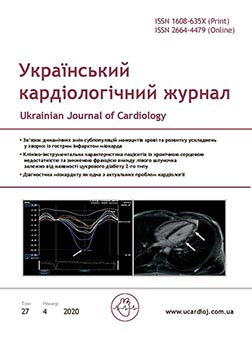Experience in implementing a regional registry of patients with acute coronary syndrome
Main Article Content
Abstract
The aim – to create a regional registry of patients who have suffered an acute myocardial infarction (AMI), to determine the frequency of endpoints: death, recurrent myocardial infarction, recurrent coronary angiography (CA), coronary artery bypass grafting (CABG), acute cerebrovascular accident (ACVA), bleeding, hospitalization after MI.
Materials and methods. 33 centers of Vinnytsya and Vinnytsya region were involved in the study. During the period 2017–2018, 2120 patients of middle age 75.9±7.7 years were included in the register. Among them 1361 (64.2 %) men, middle age 67.5±8.4 years and 759 (35.8 %) women, middle age 76.3±8.2 years. There were 1658 patients with Q-MI and 462 (21.8 %) patients with MI without Q-wave.
Results and discussion. It was found that after discharge from the hospital 419 people (13.4 %) did not visit family doctors and cardiologists. Among them were 262 (62.5 %) men and 157 (37.5 %) women. These patients did not differ significantly in gender and age structure from those who were under medical supervision. In both groups, men predominated and there were significantly more people over the age of 60. Twelve months after AMI, 37 (1.7 %) cases of CABG were documented among patients who visited doctors, 29 patients (1.4 %) were diagnosed with ACVA, and 101 patients (4.8 %) were hospitalized for recurrent AMI and 156 people (7.4 %) underwent CA. In patients with interventional AMI treatment tactics, there were significantly fewer cases of recurrent MI (p=0.022), hospitalization (p=0.025) and death (p<0.001) within 12 months. In patients with AMI, an inverse correlation was found between age and mortality, hospitalized bleeding, and CA. The connection between the fact of performing prehospital thrombolysis and hospitalization for heart failure during the year after AMI was determined. There is a negative correlation between CA and hospitalization for heart failure, bleeding that required hospitalization, re-CA and ACVA.
Conclusions. Among patients treated for acute coronary syndrome, 13.4 % do not seek outpatient medical care after discharge from the hospital. Among them are significantly more men, people over 60 years old, residents of countryside. Twelve months after AMI, 1.7 % of patients undergo CABG, 1.4 % are diagnosed with ACVA, and 1.7 % have bleeding that requires hospitalization. 25.7 % of patients are re-hospitalized during the year, 9.5 % die. Among patients who undergo emergency CA and coronary artery stenting, there are more people who have CABG and who have been diagnosed with bleeding that requires hospitalization. In this group, there is a significant reduction in cases of recurrent MI, hospitalizations and deaths during the year.
Article Details
Keywords:
References
Пархоменко О.М., Лутай Я.М., Іркін О.І. та ін. Клініко-анамнестична характеристика та перебіг госпітального періоду захворювання у хворих молодого віку з гострим коронарним синдромом з елевацією сегмента ST //Укр. кардіол. журн.– 2018.– № 4.– С. 31–39. doi: https://doi.org/10.31928/1608-635X-2018.4.3139.
Avinainder Singh, Bradley Collins, Arman Qamar Study of young patients with myocardial infarction: Design and rationale of the YOUNG-MI Registry // Clin. Cardiol.– 2017.– Vol. 40 (11).– P. 955–961. doi: https://doi.org/10.1002/clc.22774.
Franken M., Giugliano P., Goodman S.G. et al. Performance of acute coronary syndrome approaches in Brazil. A report from the BRACE (Brazilian Registry in Acute Coronary syndromes // Eur. Heart J. Qual. Care Clin. Outcomes.– 2019. doi: https://doi.org/10.1093/ehjqcco/qcz045.
Haiyan Xu, Wei Li, Jingang Yang. The China Acute Myocardial Infarction (CAMI) Registry: A national long-term registry-research-education integrated platform for exploring acute myocardial infarction in China // Amer. Heart J.– 2016.– Vol. 175.– P. 193–201. doi: https://doi.org/10.1016/j.ahj.2015.04.014.
Jánosi A., Ofner P., Al-Maktari F. et al. Patient care of patients with myocardial infarction in Hungary. Analysis of National Myocardial Infarction Registry data collecting in 2015 // Orv. Hetil.– 2017.– Vol. 158 (3).– P. 90–93. doi: https://doi.org/10.1556/650.2017.30670.
Kim Y.H., Her A.Y., Jeong M.H. et al. A comparison of the impact of current smoking on 2-year major clinical outcomes of first- and second-generation drug-eluting stents in acute myocardial infarction: Data from the Korea Acute Myocardial Infarction Registry // Medicine (Baltimore).– 2019.– Vol. 98 (10).– P. 345–352. doi: https://doi.org/10.1097/MD.0000000000014797.
Leng W., Yang J., Fan X. et al. Contemporary invasive management and in-hospital outcomes of patients with non-ST-segment elevation myocardial infarction in China: Findings from China Acute Myocardial Infarction (CAMI) Registry // Amer. Heart J.– 2019.– Vol. 215.– P. 1–11. doi: https://doi.org/10.1016/j.ahj.2019.05.015.
Nicolau J.C., Franken M., Lotufo P.A. et al. Use of demonstrably effective therapies in the treatment of acute coronary syndromes: comparison between different Brazilian regions. Analysis of the Brazilian Registry on Acute Coronary Syndromes (BRACE) // Arq. Bras. Cardiol.– 2012.– Vol. 98 (4).– P. 282–289. doi: https://doi.org/10.1590/s0066-782x2012000400001.
Poloński L., Gasior M., Gierlotka M. et al. Polish Registry of Acute Coronary Syndromes (PL-ACS). Characteristics, treatments and outcomes of patients with acute coronary syndromes in Poland // Kardiol. Pol.– 2007.– Vol. 65 (8).– P. 861–872.
Santos J.F., Aguiar C., Gavina C. et al. Portuguese Registry of Acute Coronary Syndromes: seven years of activity // Rev. Port. Cardiol. – 2009.– Vol. 28 (12).– P. 1465–1500.
Sulo G., Igland J., Sulo E. et al. Mortality following first-time hospitalization with acute myocardial infarction in Norway, 2001-2014: Time trends, underlying causes and place of death // Int. J. Cardiol. – 2019.– Vol. 294.– P. 6–12. doi: https://doi.org/10.1016/j.ijcard.2019.07.084.
Wallert J., Mitchell A., Held C. et al. Cardiac rehabilitation goal attainment after myocardial infarction with versus without diabetes: A nationwide registry study // Int. J. Cardiol. – – Vol. 1 (292).– P. 19–24. doi: https://doi.org/10.1016/j.ijcard.2019.04.049.

